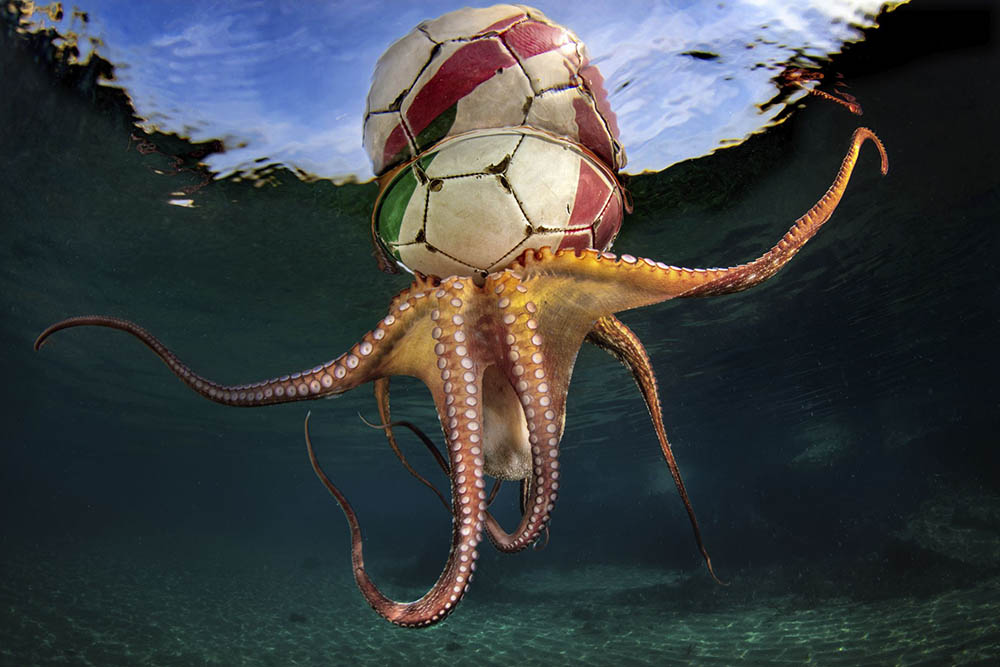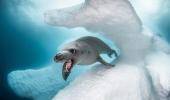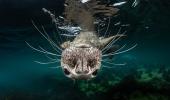Underwater Photographer of the Year celebrates photography beneath the surface of the ocean, lakes and rivers.
More than 5,500 underwater pictures were entered in 13 categories by underwater photographers from 70 countries around the world.
Scroll down to see the winning images.
(Tap on the image to view the photos in full-screen resolution)

Massive and mysterious habitats, icebergs are dynamic kingdoms that support marine life. As they swing and rotate slowly through polar currents, icebergs fertilize the oceans by carrying nutrients from land that spark blooms of phytoplankton, fundamental to the carbon cycle. During an expedition in Antarctica Peninsula with filmmaker Florian Fisher and freediver Guillaume Nery, we explored and documented the hidden face of this iceberg where crab-eater seals have taken up residence on icebergs that drift at the whim of polar currents. Photograph: Greg Lecoeur/@UPY2020

The Unicorn shrimp usually inhabits around 200 to 300 m deep, but they rise to about 40m due to breeding behaviour. There are thousands to tens of thousands of shrimps but there are only a few suitable places to shoot them. The direction and density of the tide may vary depending on the direction, strength, and brightness in the ocean. I went there many times because I could only stay for 15 minutes once a day. I was lucky to be able to find and shoot the ideal situation. Photograph: Keigo Kawamura/@UPY2020

The unfortunate reality is that human impact is found everywhere... even on the tiniest and remote of islands amongst the smallest of critters. Here, on Peleliu Island in Micronesia, a hermit crab has made use of a discarded metal can from Asia as a temporary, yet very unnatural home. Photograph: Shane Keena/@UPY2020

The Bahamas has been a shark sanctuary since 2011 but mangroves aren’t protected yet and that’s where these lemon shark pups spend the first 5-8 years of their lives. I was standing in knee-high water, trying to hold my camera still, waiting for the sharks. Trying not to move when you have mosquitoes and sand-flies buzzing around you was probably the part I struggled with the most at this moment. After less than one hour the little predators came closer and finally swam around my feet and my camera, bumping against me and trying to taste my strobes. They are curious little fellas but you need time to gain their trust and I love observing them in their natural habitat and that’s what I wanted to capture. Photograph: Anita Kainrath/@UPY2020

I never know quite what I’m going to find that will fluoresce under the blue (near UV) light but on this dive in Loch Fyne I had one target in mind and that was fireworks anemones. There were dozens of anemones at this site all with varying patterns on their tentacles which also translate to different fluorescence patterns when viewed under blue light. This particular anemone really stood out in the darkness as it’s fluorescence was so bright. Photograph: James Lynott/@UPY2020

This image takes place in the Ring of Cenotes in the Yucatan Peninsula of Mexico where the ancient Mayans believed the underground rivers were a gateway to another world. In 2019 I was in Mexico, working on a photographic project about escaping gravity, inspired in part by the 50th anniversary of the moon landings. Whilst searching for ‘another world’ I followed Brazilian free-diver and renowned conservationist, Flavia Eberhard, through a dark underwater passage and we emerged into this vast, unexplored space. Photograph: Zena Holloway/@UPY2020

At the end of a session of free diving, I noticed a soccer ball, in the distance and on the surface. Intrigued I approached it, and then I noticed that below it was an octopus that was being pulled along by the current. I do not know what it was doing under the ball, but I think it is training for the next football World Cup! Photograph: Pasquale Vassallo/@UPY2020

This tiny Common froglet is less than 1cm in length. It is so weightless it can balance on single, silken stands of Spirogyra. These algae filaments, an abundant and vital first link in freshwater food webs, reproduce rapidly leading to thousands of individual strands. They are a simple life form which combine into a tangled labyrinth known as water silk. Photograph: Laura Storm/@UPY2020

This gorgeous Okenia elegans nudibranch is considered to be a rare species in the UK, but can be quite common around Torbay in south Devon. I came across this one crawling along the edge of a kelp frond which gave me the perfect opportunity to find angle that best shows off their outlandish colours. Photograph: Dan Bolt/@UPY2020

Early in April 2019, sightings of a lone male Bottlenose Dolphin had started to be reported in and around Portland Harbour. I had been out on a local wreck dive with Dale Spree and Jessica Hannah and had had a strange feeling beforehand that the chances of meeting him were quite high. The dive itself came and went with no sighting. But fortune was to be on our side, for on our return across the harbour Dale spotted the distinctive dorsal fin. As the animal approached us, Jessica and I slipped in with just snorkeling equipment and waited, hoping... It turned out he wasn’t nervous in the slightest and swam straight to the camera. I cannot recall who’s smile was the largest. His or mine? Photograph: Colin Garrett/@UPY2020

While Komodo Dragons are primarily land reptiles, they will venture into the water if something warrants investigation. For this image we went out in a RIB to take a look at the Dragons and I had brought along my rig “just in case”. One particular Dragon came out and repeatedly got VERY close including trying to climb on and into the RIB on several occasions. I suspect that he has become habituated to humans and was looking for a handout. In hindsight I’m not sure it was the safest thing I have ever done so I’d have to add the caveat ‘Don’t try this at home!” Photograph: J Gregory Sherman/@UPY2020

Having been immersed mostly in creative macro, this is the first time I have used a snoot technique on a larger scale. Maintaining a shallow depth to capture the reflection, the snoot is used to bring focus to the model while the blue light catches the flowing veil that frames around her creating a butterfly effect. Photograph: Lilian Koh/@UPY2020

On a sunny afternoon I dived on a sandy divesite in Sugar Beach. There I found a coconut octopus crawling on the sand. When I got closer he started a nice pose for me and I got the shot. Photograph: Enrico Somogyi/@UPY2020

I went to visit the Everglades to be able to photograph the American alligator and it didn’t take long to find some alligators of considerable size and not at all afraid of my camera housing! Photograph: Mirko Zanni/@UPY2020

The picture was taken in Raja Ampat, Indonesia in November 2019 and I spent the morning taking fish portrait images. I came across a school of very friendly Rabbit fish under a jetty and took lots of schooling shots. The picture came together when the school bunched tightly together in a vertical tower with them all facing onto the camera. I hit the shutter and zoomed in at the same time, the flash freezing the central fish with the ambient light creating a Pop-Art like effect. Photograph: Nicholas More/@UPY2020

I began with a panning shot of the sea horse, captured with a 1/4 second shutter speed and a small, f/25 aperture. Then, I used the same settings to capture a panning shot of a shiny scouring pad, carried in my pocket. Both images were merged, in-camera, for the resulting double exposure shot. I must have repeated this sequence 50 times before eventually achieving this one when he made eye contact, which pleased me. Photograph: Nur Tucker/@UPY2020

In June I heard that there was a seahorse at a certain dive site in the Eastern Scheldt, at a depth of 12m. From then on, I went looking for the seahorse every week, and eventually found it in August. It was posing so nicely around a pipe that I had ample time to photograph it with the snoot. This gives the seahorse an angry look, but that is fortunately a mere appearance. Photograph: Rooman Luc/@UPY2020

The creation of this image was inspired by in-camera double exposure photography. This black and white image was made by first shooting a silhouette against a cloudy afternoon sky. The picture was then re-exposed against the image of a coral garden. While this image pays homage to subjects most dear to me, I hope that viewers could find their own meaning as they juxtapose the elements and contrasting textures in the picture. Photograph: Mok Wai Hoe/@UPY2020

The Isles of Scilly offer underwater photographers some of the best opportunities for wide angle photography in the UK so I was determined to make the most of it when I visited for a week in September 2019. This image was shot at a site whose location is known only to the excellent skipper of Dive Scilly and it proved to be a stunning site with jewel anemones everywhere. This was the first dive of the week and it was my first dive with my new camera and housing. After a shot to check exposure and lighting, I took this one and it proved to be the best of the week! Photograph: Arthur Kingdon/@UPY2020

When I was just about finishing my dive, I suddenly spotted a visually attractive picture of Jessea flicking her sleeves on a crystal clear blue background with a beam of sun rays. Several reef sharks swim outwards as if she is in full command of them. For the first time, I realized that humans and nature can be harmonised in fashion. I couldn't resist the temptation of getting closer to capture this beautiful moment. Photograph: Wayne Lai/@UPY2020

I went to Kei to shoot leatherback turtles. On the first day out, our boat happened to witness the local villagers hunting this turtle with a harpoon. They speared it and battled with it for at least an hour. The weakened turtle was then brought near the boat, where it was bludgeoned over the head. I asked permission to jump in and photograph the hunt, which used to be associated with traditional beliefs and rituals, but now mainly serves as a food source for the growing population of islanders. Photograph: Scott Gutsy Tuason/@UPY2020

I still find it extraordinary that it is possible to snorkel alongside the world's second biggest shark just off the west coast of Scotland. Each summer these huge animals usually gather in large numbers in the waters around the Inner Hebrides archipelago. Basking sharks offer no threat to humans - their food is mostly animal plankton funnelled through their enormous mouths and strained through specialised gill structures. Photograph: Will Clark/@UPY2020

Panoramic image of the engine room of the Chrisoula K. with six video lights placed behind the engines. I went there on several trips with a liveaboard, being able to check out the possibilities of creating some different lighting in the wrecks. But usually the boats do only 1-2 dives per wreck, so I had to be quick in decisions. The space between the engine inside the wreck is very narrow and the angle for a single photo was just not enough, so I thought it was the best idea to create a panoramic image to display the machine room in one shot. Photograph: Tobias Friedrich/@UPY2020

Fotteyo overhangs, with golden bunches of soft corals that you can see in this picture, is a rather famous place in the southern Maldives. It is impossible to cover the cave even with a fisheye lens due to its small depth. That’s how I decided to create a panorama of this place. It was my first underwater panorama created with the use of lighting and I am so happy that such technologies push the boundaries of underwater photography. Photograph: Oleg Gaponyuk/@UPY2020














